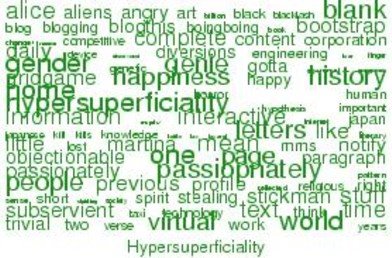Outrageously, circumstances have prompted me to leave my beloved place of residence, a more or less peaceful city made up of almost 2 million inhabitants. I washed up on the shores of the pedestrian precincts of a much smaller town - about a quarter of a million citizens. The people around me seemed locked in a slow motion bubble. Had it not been for a native who held on to me, I'd have shot through this placid crowd like a bit of greased lightning.
Luckily for you and I differing pedestrian speeds are already lovingly described in the
Glass Maze (via
The Philosophical Marshmallow (via
Give me spirit fingers dammit)).
The Glass Maze also mentions different styles of dress between "the sticks" and the city. You bet there was a difference between dress styles in my beloved little metropolis and the provincial town. The dwellers of the provicial plains sport their textiles almost entirely without any style whatsoever. Let them walk in Hennes or Chanel, they uniformly look like freshly licked puppy dogs as opposed to Hamburg where you will find a fair degree of mix and (mis)match - and oh, for goodness sake - some litter in the streets!
There also is a difference in atmosphere and I just love the way the Glass Maze extracts this from a café latte:
There’s a franticness about the city coffee delivery system that differs in both kind and degree from the bustle of your typical suburban Starbucks: it’s more frantic, certainly, but it’s also possessed of a certain kind of paradoxical languor, as if all of this mayhem is right and proper and thoroughly expected, the way things really ought to be.
People do this. Effortlessly, at times even elegantly, we recognise patterns. We do this more often than not without even realising what we are about. And yet it was only yesterday that I was fascinated by Kevin Kelly's predictions for scientific advancements to be expected (to his mind) within the next 45 years.
Pattern Augmentation – Pattern-seeking software which recognizes a pattern in noisy results. In large bodies of information with many variables, algorithmic discovery of patterns will become necessary and common. These exist in specialized niches of knowledge (such particle smashing) but more general rules and general-purpose pattern engines will enable pattern-seeking tools to become part of all data treatment.
SPECULATIONS ON THE FUTURE OF SCIENCE, By Kevin Kelly (via kottke)
I was even more fascinated by Kelly's "Multiple Hypothesis Matrix"
Instead of proposing a series of single hypothesis, in which each hypothesis is falsified and discarded until one theory finally passes and is verified, a matrix of many hypothesis scenarios are proposed and managed simultaneously. An experiment travels through the matrix of multiple hypothesis, some of which are partially right and partially wrong. Veracity is statistical; more than one thesis is permitted to stand with partial results. Just as data were assigned a margin of error, so too will hypothesis. An explanation may be stated as: 20% is explained by this theory, 35% by this theory, and 65% by this theory. A matrix also permits experiments with more variables and more complexity than before.
Old hat, you might say: is not this precisely what makes large (non-hierarchical) groups of people more intelligent than any single human being?
Yet I choose to remain fascinated. Not only do we recognise patterns easily and process competing hypotheses in social matrices/systems, we are aware of these achievements and build machines which attempt to emulate them.
Pattern Recognition





